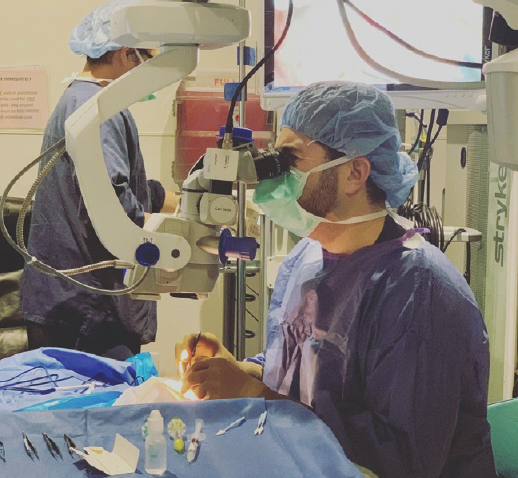
Everyone has a unique professional journey. Sometimes, the first path you take lands you in your dream job, and sometimes it takes a few wrong turns before you find your way. I started practicing ophthalmology in a private practice in Southern California. When I joined the practice in 2004, I planned to use it as a learning experience—to learn more about how private practice works, perform as much surgery as possible to master the trade, and establish myself in the community. After 6 months, however, I was promoted to partner, and I ended up staying there for 14 years.
As time wore on, I found I was asking myself what I wanted to achieve in my career. I was a high-volume surgeon who was established in the community, but I wanted more autonomy and, ultimately, the opportunity to build a practice and better serve my patients by offering them a personalized treatment plan. In 2019, I founded the Vision Eye Institute, a boutique refractive cataract surgery practice with a philosophy of enhancing the patient experience through camaraderie and a team approach to care.
HUMBLE BEGINNINGS
I ran several businesses before medical school, including hair salons and Subway sandwich shops. I began learning business strategies from my parents when I was just 10 years old. Through these experiences, I learned about managing people, growing a business, inventory, and profit and loss margins. I learned how to talk to customers and connect with people.
I have always had a sense for business. When I joined a group practice, however, I had no opportunity to contribute operationally and managerially. At the start of my career, I convinced myself that it was better to focus on surgery and patient volume and to put the business side of medicine on hold. With more surgical experience under my belt, my desire to pursue this other aspect of patient care grew. I started to envision what it might be like to manage my own private practice. The group practice where I was a partner had several areas of focus, including surgery, optometry, and optical. This range of services seemed to me to hinder rather than enhance patient care.
Putting together a vision for a practice is an intense mental exercise. It requires asking yourself tough questions:
- What am I good at?
- What do I enjoy doing?
- What is the breadth of my focus?
- What do I stand for?
- What is my mission?
- What are my values?
I am good at surgery and enjoy performing it (Figure), and I wanted to focus on surgery only. I devised a mission and a set of core values and built a team that I felt would complement those elements of my private practice.

Figure. Dr. Sadri performing surgery in his practice, Visionary Eye Institute.
When staffing my practice, I find it helpful to identify individuals with two personality traits that I observe to be common in most successful people, what I call get-to-it-ness and stick-to-it-ness. When these individuals are able to do something, they routinely find a way to get to it, and they stick to it no matter what happens. It’s not that these individuals have all the answers, but they break down barriers in order to achieve their goals.
A (not so) SMOOTH TRANSITION
My boutique practice opened in November 2019, and then COVID-19 hit in March 2020. The pandemic has been a challenging time, but thankfully my glaucoma surgery practice and my involvement in clinical trials allowed me to continue seeing patients. My facility never shut down completely, but I was not able to perform cataract or refractive surgery.
Staffing remains a challenge. Part of my responsibility as a small business owner is to manage people. My practice invests in the staff, and time is taken to train them in the area where I feel they will be most successful and productive. Sometimes, however, staff members decide to leave or move in a different direction. I am prepared for this and leave emotions out of it. When I opened the practice, I thought of my team as a family, but then I realized I’m creating an enterprise. I had to be okay if staff members came and went.
FINDING A BALANCE
Since the initial COVID-19 lockdown was lifted, I have been able to find and maintain a delicate balance between surgery, clinical research and studies, and practice management. I continually find new ways to offer patients a personalized treatment plan that is tailored to their needs and lifestyle, including the addition of aesthetics and dry eye disease services. In this process, I have identified what I believe to be the two biggest advantages of owning a boutique refractive cataract surgery practice.
Advantage No. 1: Private practice will always be around. The recent trend in medicine is away from a private/boutique practice and toward private equity and consolidation. I believe, however, that there will always be an opportunity to go into private practice. If you want more autonomy or to do something unique, private practice is a great path. Moreover, I believe that a lean practice focused on delivering excellent experiences and outcomes will flourish. There is one caveat: You must do this in a mindful way. Understand the nuances before you jump in. Have a plan, know the market, and set yourself up for success.
Advantage No. 2: Boutique practices can emphasize the patient experience. Patients don’t want to feel like a number. I often see patients who left another practice because they did not receive the level of care or the experience they expected. The golden rule that we follow at my practice is to treat everybody the way that we want to be treated. I always tell my cataract patients, “I’m going to operate on you like you’re one of my parents.”
I am also proactive about building trust with my patients. Before they even meet me, they’ve read about me on my practice’s website, and they’ve gotten a feel for the practice culture through our social media accounts. Further, when patients enter the practice, one of the first things they notice is that our waiting room has only one couch. This is intentional; we want patients to be seen by their practitioner immediately instead of sitting in a waiting room. Patients are busy, and we honor their time to gain their trust.
CONCLUSION
The practice of medicine is constantly changing. A boutique refractive cataract surgery atmosphere allows me to adapt to the times, diversify patient care, innovate, and improve patients’ quality of life in an elegant way.




